I'm working on a program in ARM64 gcc 11.2 Assembly and am experiencing a bug that I do not know how to fix. The goal of this program is to recursively call a function on a double array of numbers, then print out the highest double. In C, this function is:
#include <stdio.h>
#define SIZE 10
double arr[SIZE] = {6.221, 1.0, 14.1, 46.5, 62.1, 7.7, 4.4, 1.5, 500.023, 2.1}; // get the array
double max_value(double array[], int size) {
if (size == 1) {
return array[size - 1];
} else {
double max = max_value(array, size - 1);
if (array[size - 1] > max)
max = array[size - 1]; // iterate to the next index of the array
return max;
}
}
int main() {
printf("%g\n", max_value(arr, SIZE)); // print`
return 0;
}
With that in mind, I've written the following in ARM64 gcc 11.2:
.global _start // https://stackoverflow.com/questions/17898989/what-is-global-start-in-assembly-language
// global_start adds _start to the object code, global is NASM specific
// and it will start the file
.text
.extern printf // start the file
maxvalue:
stp x29, x30, [sp, -48]!
mov x29, sp
str x0, [sp, 24]
str w1, [sp, 20]
ldr w0, [sp, 20]
cmp w0, 1
bne .L2
ldr x0, [sp, 20]
lsl x0, x0, 3
sub x0, x0, #8
ldr x1, [sp, 24]
add x0, x1, x0
ldr d0, [x0]
b .L3
.L2:
ldr w0, [sp, 20]
sub w0, w0, #1
mov w1, w0
ldr x0, [sp, 24]
bl maxvalue
str d0, [sp, 40]
ldr x0, [sp, 20]
lsl x0, x0, 3
sub x0, x0, #8
ldr x1, [sp, 24]
add x0, x1, x0
ldr d0, [x0]
ldr d1, [sp, 40]
fcmpe d1, d0
bmi .L6
b .L4
.L6:
ldr x0, [sp, 20]
lsl x0, x0, 3
sub x0, x0, #8
ldr x1, [sp, 24]
add x0, x1, x0
ldr d0, [x0]
str d0, [sp, 40]
.L4:
ldr d0, [sp, 40]
.L3:
ldp x29, x30, [sp], 48
.LC0:
.string "%g\n"
_start:
stp x29, x30, [sp, -16]!
mov x29, sp
mov w1, 10
adrp x0, arr
add x0, x0, :lo12:arr
bl maxvalue
adrp x0, .LC0
add x0, x0, :lo12:.LC0
bl printf
// print a new line
mov w0, 10
bl putchar
mov w0, 0
ldp x29, x30, [sp], 16
.data
// declare an array - the one I'm using is below
//double arr[SIZE] = {6.221, 1.0, 14.1, 46.5, 62.1, 7.7, 4.4, 1.5, 500.023, 2.1}; // get the array
arr:
.word -755914244
.word 1075372621
.word 0
.word 1072693248
.word 858993459
.word 1076638515
.word 0
.word 1078411264
.word -858993459
.word 1078922444
.word -858993459
.word 1075760332
.word -1717986918
.word 1074895257
.word 0
.word 1073217536
.word 893353198
.word 1082081374
.word -858993459
.word 1073794252
I'm getting these errors (screenshots with the terminal commands that I'm using & errors generated).

